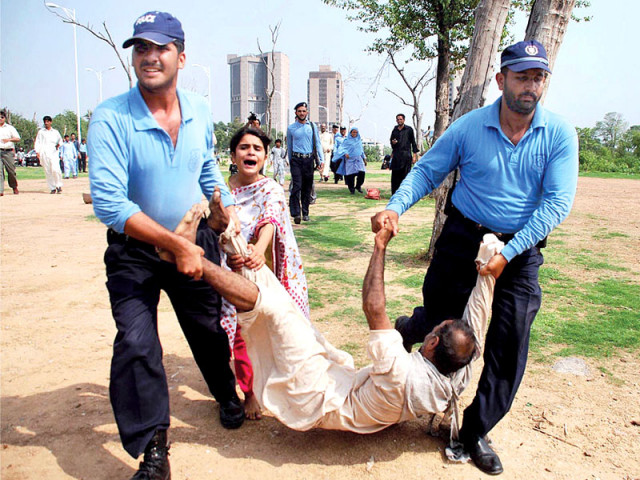With everything gone, extreme step brings more misery for a family from Sindh
Family members were arrested for attempting suicide after feudal lord took their lands.

Muhammad Kamran was only a month old when his parents were forced out of their home in Dadu District, Sindh by an ‘honourable’ landlord. A feudal lord confiscated 70 acres of their farmland after declaring one of them Karo, and thus eligible to be killed in line with the centuries-old black tradition of Karo Kari.
No police or any other government official came to their help. Dad Hussain Chandio, 27, was accused of eloping with the landlord’s niece and was declared Karo. However, Hussain maintained innocence and the girl was later found safe and well in a nearby town.
Kamran, now eight-months-old, has just begun toddling. He was with a dozen other members of his family as they came to Islamabad, hopeful that the highest echelon of the justice system, the Supreme Court, would help them return to the life that was stolen from them. Instead, much like the child, they have fallen at every hurdle.
Camped outside the National Press Club for months, his elders – his father, four other men and three women of the family-- finally gave up hope and attempted suicide by self-immolation on July 16.
“We have been begging for help but no one is bothered. We are sick of this living,” were the words of Dad Hussain Chandio, the alleged Karo, and his brother Imam Din Chandio, little Kamran’s father, before they attempted to end their lives.
Hussain, Din, Tufail, Muhammad Malook and Muhammad Altaf, along with Muradaan, 30, and her daughter Hawwa, 14, and Pari, 18, were saved after police personnel deployed at the site intervened and rushed them to a nearby hospital. In an ironic twist, they were booked and wound up in jail for attempting suicide, while the feudal lord remained free.
Only four women including Hussain’s elderly mother Pathani were left behind at the camp. Unaware of what had happened, they thought their husbands and brothers have gone to jail while the three women had gone “missing”. “We went to the hospital and they said our women were gone,” said Parveen, Din’s wife.
Unfamiliar with the city and without the men to run errands, the remaining women and children were given food by another protester camped nearby. “I am tired of living a miserable life in these camps,” said Naseeban, Malook’s wife. She said her husband and others decided to commit suicide after life became “unbearable”.
She vehemently denied that their decision was a stunt to attract attention. Naseeban said they had let members of press know that they would commit mass suicide if the authorities kept on ignoring them.
“They were warned on the spot that they would be arrested if they attempt suicide as it was a crime punishable under the law,” said a Kohsar police official on condition of anonymity. Asked why the Chandio family were allowed to take the extreme step, the police official said the city administration did not issue instructions to them to take pre-emptive measures earlier. We only acted when we saw the people trying to burn themselves, he said.
The jailed men and women were released by a court before the weekend. Dad Chandio said he would go to the Supreme Court registrar again to check on the status of his application, a hearing on which has been pending for about six months.
Published in The Express Tribune, July 24th, 2012.



















COMMENTS
Comments are moderated and generally will be posted if they are on-topic and not abusive.
For more information, please see our Comments FAQ